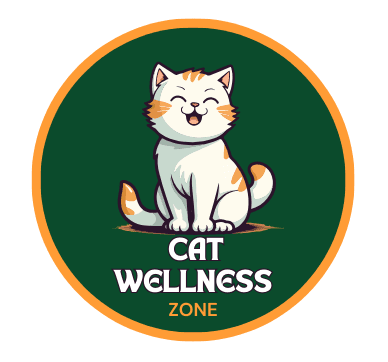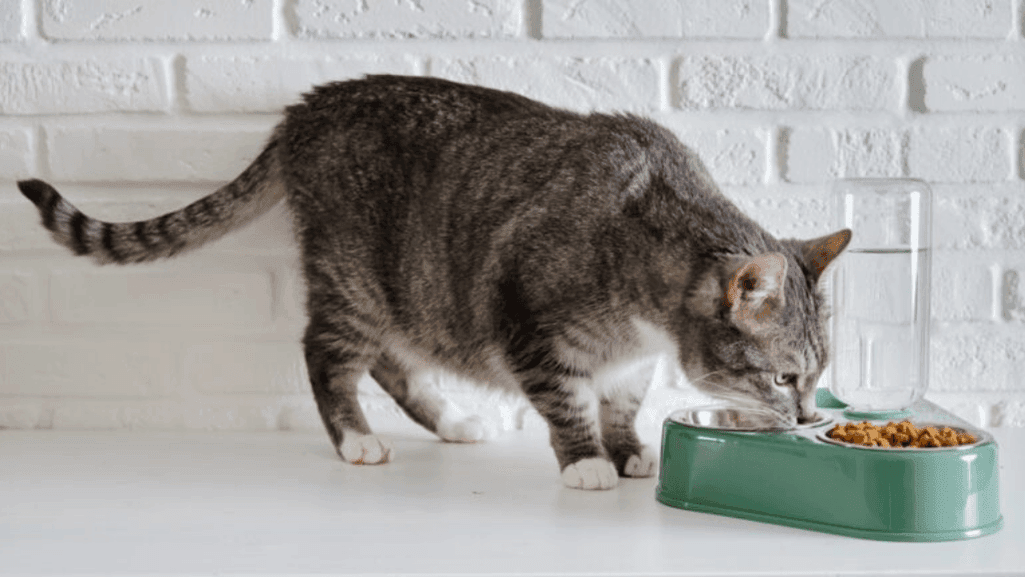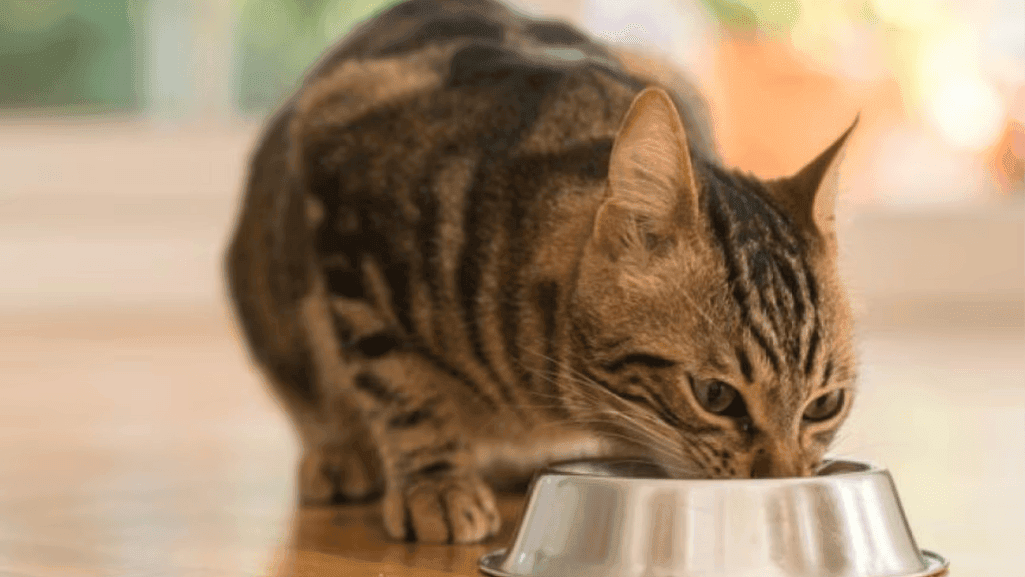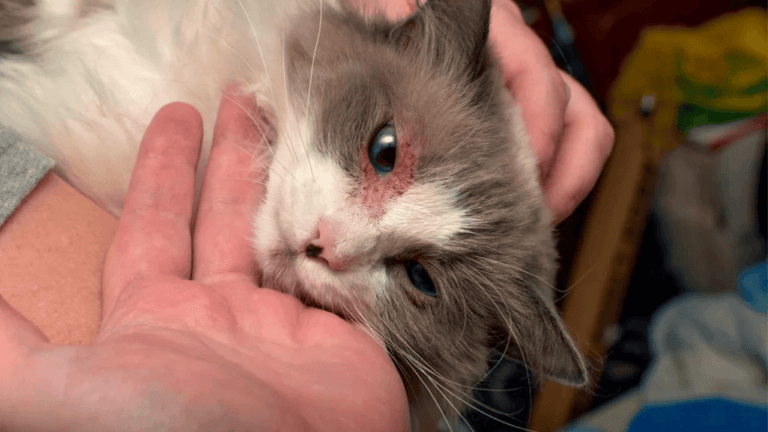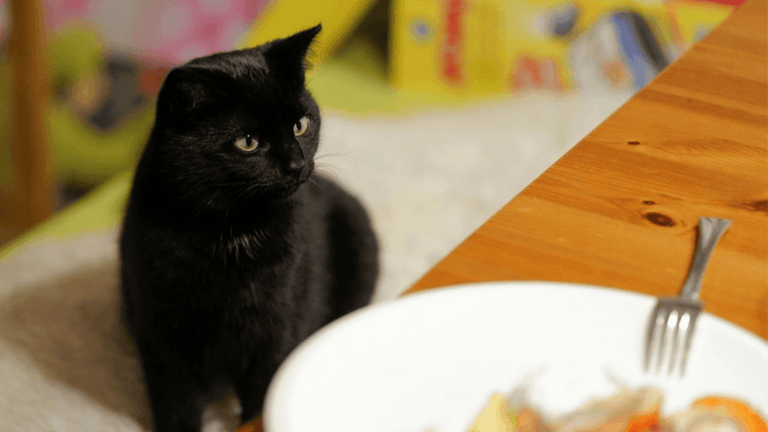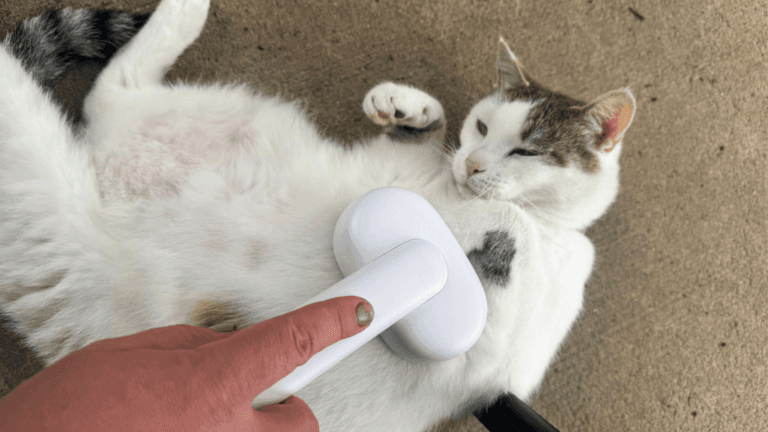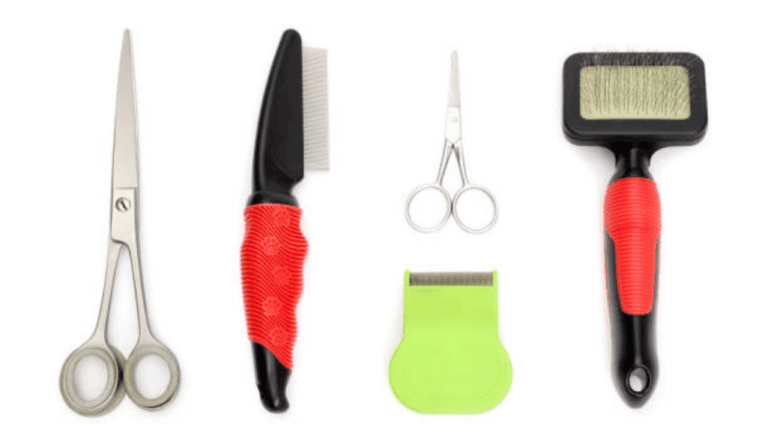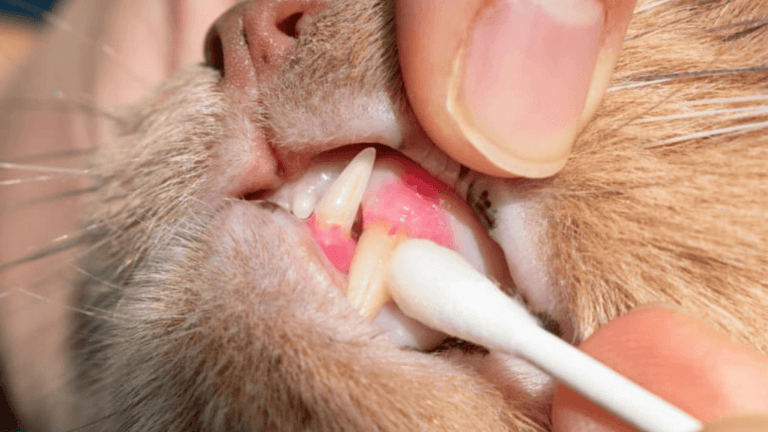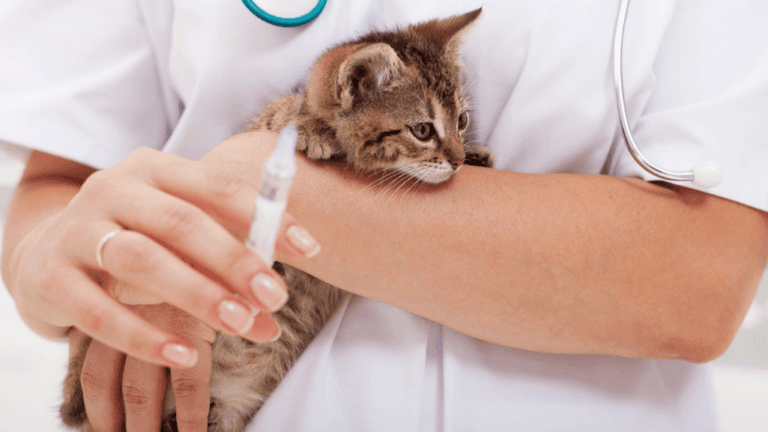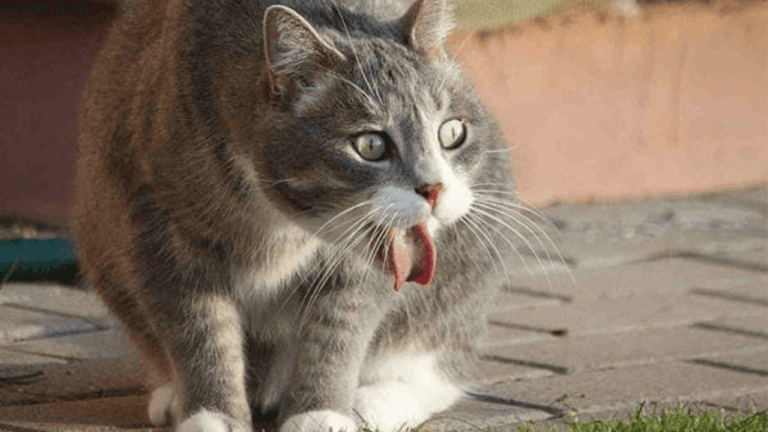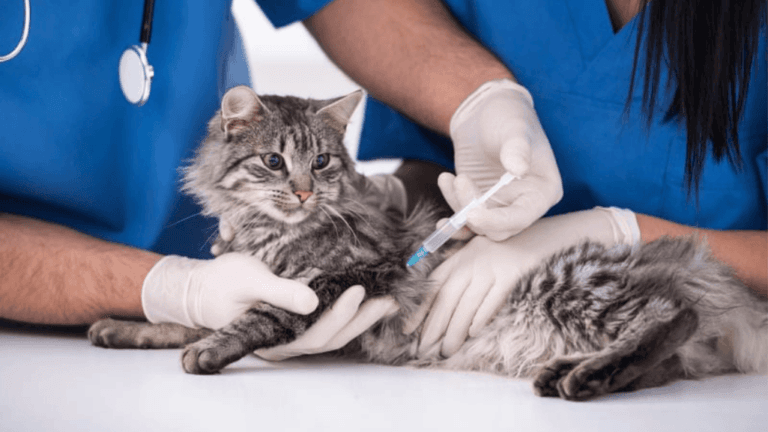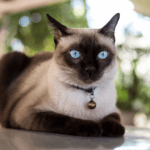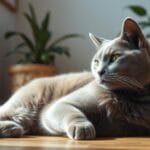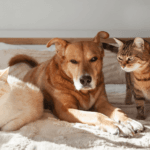As our feline friends get older, it’s vital to watch their health closely. Senior cat weight loss is a big worry for many pet owners. About 15% of cats over 12 years old are underweight. While some weight loss is normal, sudden or significant loss can mean serious health problems.
It’s important to keep an eye on your aging cat’s weight. Regular weigh-ins and body condition checks can help spot changes early. If you see your cat losing weight, and they seem different, talk to your vet right away.
There are many reasons why senior cats might lose weight. Dental disease, IBD, chronic kidney disease, and hyperthyroidism are just a few. These issues can make it hard for your cat to eat and absorb nutrients, leading to muscle loss and weight drop. Taking care of an aging cat also means adjusting their diet to keep them healthy.
Key Takeaways
- Senior cat weight loss is common but not always normal, affecting about 15% of cats over 12 years old
- Monitor your aging cat’s weight regularly and consult with a veterinarian if you notice signs of weight loss
- Dental disease, IBD, chronic kidney disease, and hyperthyroidism are common causes of weight loss in senior cats
- Aging cat care involves addressing changes in nutritional needs and providing appropriate support
- Early detection and intervention are key to managing senior cat health issues and maintaining quality of life
Understanding Senior Cat Weight Loss
As cats get older, their bodies change in ways that can affect their weight and health. Senior cat weight management is key, as older cats are more likely to gain or lose weight and face health problems. Keeping an eye on your cat’s weight can help them stay healthy and happy as they age.
Common Changes in Senior Cats
Senior cats, those over 11 years old, often have trouble absorbing nutrients. Studies show that cats over 14 years old may have trouble digesting proteins and fats. This can lead to aging cat slimming and muscle loss, known as sarcopenia.
Other reasons for kitty weight depletion in senior cats include gut issues, less appetite, dental pain, and sore joints. Medications can also cause taste or nausea problems. Health issues like hyperthyroidism, kidney disease, and diabetes can also affect their weight.
Monitoring Your Cat’s Weight
It’s important to regularly check your senior cat’s weight. Look for a visible waist and feel their ribs to see if they’re at a healthy weight. Weekly weight checks and vet visits are recommended for good feline geriatric weight management.
“Veterinary body condition assessments play a key role in checking senior cats’ health. It’s hard for owners to notice muscle loss in senior cats before it gets severe.”
By being watchful and addressing weight issues early, you can help your senior cat stay healthy. This can greatly improve their quality of life in their later years.
Signs of Weight Loss in Older Cats
As cats get older, their bodies change in many ways. One big concern is senior cat thinning, which might mean they’re not feeling well. Knowing the signs of weight loss in older cats is key to keeping them healthy and happy.
About 30% of cats over 12 years old have trouble digesting fat. Around 20% of cats over 14 years old have trouble digesting protein. These issues can lead to deteriorating cat body condition in senior cats.
Gradual vs. Rapid Weight Loss
Senior cats can lose weight slowly or quickly, depending on why they’re losing it. When a mature cat starts dropping weight, they lose fat first, then muscle. Slow weight loss is harder to notice, but it’s important to watch your cat’s body condition score.
Quick weight loss, on the other hand, is a big warning sign. It could mean serious health problems like cancer. For example, lymphoma can make an older cat lose weight fast. If you see this, get your cat to the vet right away.
Identifying Muscle Loss
It’s easier to see when a cat loses fat, but muscle loss is harder. You can feel if your cat is losing muscle by feeling their spine. Their legs, too, will look skinnier.
“Cats typically need at least 26-30% crude protein in their diet to prevent muscle protein breakdown leading to weight loss.”
Keeping muscle mass is important for senior cats. It helps them stay strong, move well, and live better. If you think your cat is losing muscle, talk to your vet. They can help figure out why and how to fix it. This might mean changing their diet or giving them supplements or medicine.
By watching for the signs of weight loss in older cats, you can help them stay healthy and happy for years to come.
Common Causes of Weight Loss in Senior Cats
As cats get older, they face more health problems that can cause weight loss. Senior cat weight issues are a big worry for many pet owners. These issues can signal deeper health problems. Common causes include dental disease, inflammatory bowel disease (IBD), chronic kidney disease, and hyperthyroidism.
Dental Disease
Dental disease is common in older cats. It causes pain and discomfort while eating. This can lead to less appetite and weight loss. Regular dental care can help prevent and manage this disease, keeping older cats healthy.
Inflammatory Bowel Disease (IBD)
Inflammatory bowel disease (IBD) is another reason for weight loss in senior cats. It causes inflammation in the intestines and stomach. This leads to discomfort, diarrhea, and less appetite. Cats with IBD may not get enough nutrients, leading to cat malnutrition.
Treatment for IBD includes changing their diet and using medications. A vet must closely monitor their cat dietary needs.
Chronic Kidney Disease
Chronic kidney disease affects many senior cats. It makes their kidneys work less efficiently. Cats may feel nauseous, eat less, and lose weight.
About 30% of older cats have this disease. Symptoms include more thirst, frequent urination, and changes in appetite. Managing this disease involves a special diet and regular vet check-ups.
Hyperthyroidism
Hyperthyroidism is when the thyroid gland makes too much hormone. Senior cats are most at risk. Untreated, it can cause weight loss, diarrhea, and high blood pressure.
Cats with this condition may eat more but lose weight because they burn calories faster. Treatment includes medication, diet changes, and sometimes surgery or radioactive iodine therapy.
Other reasons for weight loss in senior cats include cat diabetes, cancer, and arthritis. It’s important for owners to watch their cat’s weight and see a vet if they notice changes. Early treatment can improve a senior cat’s life and address health concerns related to aging.
Accompanying Symptoms to Watch For
As your senior cat ages, they might lose weight due to various reasons. It’s important to watch for other symptoms that could mean they have health problems. These signs can help you and your vet figure out why your cat isn’t eating well and find the right treatment.
Gastrointestinal Issues
Older cats often have stomach problems like vomiting and diarrhea. These issues can make it hard for them to absorb nutrients, leading to more weight loss and dehydration. If your cat is vomiting, has diarrhea, and isn’t eating, you should see a vet right away.
Changes in Behavior and Activity Level
As cats get older, they might act differently or move less. Look out for signs like:
- Increased vocalization, specially at night
- Difficulty jumping or climbing
- Decreased interest in playing or interacting
- Changes in litter box habits
These changes could mean your cat is in pain, uncomfortable, or has cognitive issues. All these can affect their appetite and weight.
Fur Changes
You might also notice changes in your cat’s fur. If it’s dull, dry, or unkempt, it could be a sign of a health problem. Cats with pain or mobility issues might not be able to groom themselves properly.
By keeping an eye on these symptoms and working with your vet, you can find out why your cat is losing weight. Then, you can create a treatment plan that meets their needs.
When to Consult Your Veterinarian
As a responsible pet owner, watching your senior cat’s weight is key. If your cat loses weight, it’s time to see the vet. Early action is important to manage cat health conditions and get the right care.
Importance of Early Detection
When you take your senior cat to the vet for weight loss, they’ll check everything. They might look at your cat’s teeth, see if it’s muscle loss or just weight loss, and do blood and urine tests. This helps find the cause early.
- Examining your cat’s teeth for signs of dental disease
- Determining if the weight loss is due to muscle loss or overall weight reduction
- Recommending blood work and urine testing to evaluate organ function
Early detection means your vet can make a plan just for your cat. This can stop serious illnesses from getting worse.
Diagnostic Tests
After the first check, your vet might suggest more tests. These could be X-rays, ultrasound, or biopsies. Each test helps figure out what’s going on inside your cat.
- X-rays to visualize internal organs and structures
- Ultrasound imaging to assess organ health and detect abnormalities
- Biopsy procedures to collect tissue samples for analysis
Your vet will explain each test and how it helps your cat. By sharing your cat’s symptoms, diet, and lifestyle, you help get a correct diagnosis and treatment.
“Regular check-ups with your veterinarian are essential for cat obesity prevention and maintaining your senior cat’s overall health and well-being.” – Dr. Jane Smith, DVM
Good senior cat nutrition is key for a healthy weight and health. Your vet can suggest the best diet for your aging cat. By watching your cat’s weight and getting vet care when needed, you can improve their life in their golden years.
Strategies to Help Senior Cats Gain Weight
As cats get older, they might lose weight for many reasons. Geriatric cat care is about fixing these problems and helping them stay healthy. If your cat is losing weight, it’s important to act fast to keep their muscles strong and their health good.
First, talk to your vet about your cat’s weight loss. They can find health issues like dental problems or kidney disease. Your vet might give medicine or appetite boosters to help your cat eat more.
Nutritional Supplements
Nutritional supplements are also key for your senior cat’s health and weight gain. Good supplements include:
- Glucosamine and chondroitin for joint health
- Omega fatty acids for skin and coat health
- Coenzyme Q10 for heart health and energy production
These supplements help keep your cat’s muscles strong and their energy up. But, always check with your vet before adding new supplements to make sure they’re right for your cat.
Dietary Changes
Changing your cat’s diet is also important for weight gain. Here are some tips:
- Choose high-protein, low-carbohydrate foods for senior cats
- Feed smaller meals more often
- Warm the food a bit to make it smell better
- Make sure they eat in a quiet, stress-free place
If your cat has a health issue, your vet might suggest a special diet. Every cat is different, so you might need to try a few things to find what works best.
“Patience and persistence are key when it comes to helping your senior cat gain weight. With the right combination of medical care, nutritional support, and loving attention, you can help your furry companion thrive in their golden years.”
Remember, regular cat exercise is also important. Gentle play and interactive toys can help keep your cat’s appetite up and muscles strong. By working with your vet and using these strategies, you can help your senior cat stay healthy and happy.
Conclusion
Senior cat weight loss is a big issue that needs attention from pet owners. As cats get older, their metabolism slows down. They might eat less, move less, and feel less well.
Some weight loss is okay as cats age. But, if they lose weight fast or a lot, it could mean they’re sick. They might have dental disease, inflammatory bowel disease, chronic kidney disease, or hyperthyroidism.
Pet owners should watch their cat’s weight and health closely. Look for changes in how they act, eat, or look. Catching weight loss early and getting vet help fast is key. Tests like blood work and imaging can find the cause and help fix it.
To keep senior cats healthy, change their diet and exercise. Also, manage any health problems they have. Working with a vet is important. This way, your venerable cat gets the best care as they age. By understanding and acting on weight loss, you can help your cat live well into their senior years.
